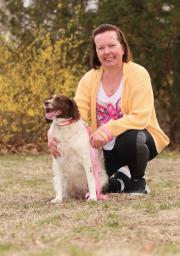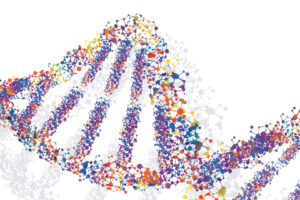 Linda Chiarella, a mother of three from Jackson, is living proof of how far science and medicine have come in fighting cancer. Diagnosed with stage 4 breast cancer four years ago, her scans are now essentially normal.
Linda Chiarella, a mother of three from Jackson, is living proof of how far science and medicine have come in fighting cancer. Diagnosed with stage 4 breast cancer four years ago, her scans are now essentially normal.
Interestingly, Linda’s story began when her dog Holly, a Brittany, kept pawing at her right breast. Thinking something was wrong, Linda, then age 47, had her first mammogram at the Star and Barry Tobias Women’s Health Center at CentraState. Board-certified radiologist Peter Mezzacappa, MD, ordered follow-up tests, and a biopsy confirmed his suspicions: Linda had invasive ductal carcinoma, a type of breast cancer. She had surgery at CentraState to remove the tumor along with some surrounding tissue and lymph nodes. Unfortunately, a PET scan revealed that the cancer had spread to her liver and spine.
Molecular and Genetic Testing Pinpoints Treatment
At the recommendation of Bhavesh Balar, MD, a board-certified hematologist/oncologist on staff at CentraState and with Regional Cancer Care Associates, molecular testing was conducted on the tumor to identify any specific markers that might be present on the cancer cells. In addition, genetic testing was performed to look for mutations, to determine if the cancer had a hereditary component, and to see whether Linda was at risk for other types of cancer. Together, these tests are used to pinpoint targeted therapies for cancer treatment based on an individual’s genetic makeup and cancer type.
Targeted Therapy for Breast Cancer
“When we find a unique feature for which we have a targeted therapy, it’s a home run,” explains Dr. Balar. “These treatment advances are enabling us to transform stage 4 cancer into a chronic illness that can be managed effectively.”
Testing revealed that Linda’s cancer was HER2-positive, meaning she was a candidate for targeted therapy. Linda received treatment with a combination of medications—trastuzumab and pertuzumab—specifically targeting the HER2 protein present on the cancer cells.
Four years later, Linda says she feels “terrific.” The lesions on her liver and spine are gone. Every three weeks, she receives a targeted therapy treatment to help maintain her good health. And while she still grapples with bouts of fatigue, she’s committed to staying active. She and her husband frequently shoot sporting clays and she knits lap blankets for other patients receiving cancer-related therapy, often with Holly by her side.
“I laugh that my first diagnosis came from my dog,” Linda says. “If your pet does something unusual, they may be trying to tell you something. Holly set off a course of action that saved my life.”
“Luckily, cancer was just a bump in the road of life for me,” she adds.
“You can’t let things deter you from enjoying the life you still have. With a positive attitude and the right support, you can get through anything.”
The Statesir Cancer Center at CentraState delivers comprehensive treatment and support services to help patients and their families. To learn more, visit centrastatecancercenter.com or call 855-411-CANCER (855-411-2262).





